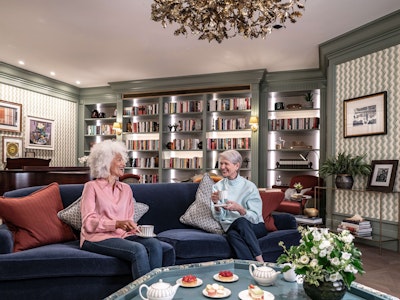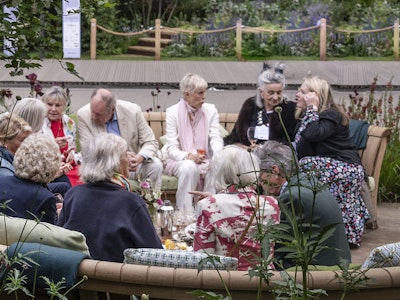What is a Residential Care Home? Retirement Living Alternatives

In this guide, we’ll look at where residential care homes sit within the broader landscape of later-life housing options. We'll explore what they are, who they support, how they differ from nursing homes, what to look for if you're considering one, and how the concept differs from what we offer here at Auriens.
Here's what we'll cover:
- What residential care homes are
- Their key features
- How residential care homes differ from nursing homes
- Advantages and disadvantages
- How to choose a care home
What is a Residential Care Home?
A residential care home is a living facility for older adults who need help with day-to-day personal care, but who do not require ongoing medical treatment. This includes assistance with things like washing, dressing, taking and managing medication, and meals, as well as housekeeping and support with mobility.
Unlike nursing homes, residential care homes do not provide medical or nursing care on site. Instead, they offer a safe, supervised setting with communal living and 24/7 access to trained carers. Some residents stay long term, while others may move in temporarily after a hospital stay or during a period of transition.
Key Features of Residential Care Homes
Residential care homes offer a range of practical services and built-in support designed to meet the everyday needs of older adults. Below are some of the typical features that define this style of care-led living:
- 24/7 staff support: trained carers are available at all times to assist with personal care and respond to any emergencies, providing reassurance for residents and peace of mind for families
- Accommodation and communal spaces: residents often have a private bedroom and access to shared areas such as lounges, dining rooms, and gardens. Homes may also offer ensuite rooms or small apartments within the home.
- Daily meals and housekeeping: all meals are prepared and served on-site, with staff managing cleaning, laundry, and general upkeep. Nutritional needs are typically considered when planning meals.
- Help with personal care: support with everyday activities such as dressing, bathing, grooming, and managing medication is a core feature of residential care homes. Carers are trained to deliver this help in a respectful, dignified manner.
- Social activities and community atmosphere: most care homes offer structured social activities including games, entertainment, exercise classes, and outings. These are designed to build a sense of community and help residents maintain emotional wellbeing.
How Do Residential Care Homes Differ from Nursing Homes?
Residential care homes and nursing homes share some similarities, and one key differentiator - namely, medical care. Residential homes provide personal care, while nursing homes are equipped to offer 24/7 medical support from registered nurses.
The table below gives at-a-glance information about the differences between the two accommodation types:
| Feature | Residential care homes | Nursing homes |
|---|---|---|
| Medical care | Not routinely provided | Provided 24/7 by registered nurses |
| Staff | Trained carers | Carers and qualified nursing staff |
| Suitable for | Individuals needing help with daily tasks | Individuals with complex medical needs |
| Costs | Typically lower | Often higher due to medical staffing |
| Typical residents | Elderly, mobility-limited, early dementia | Post-surgery, advanced dementia, chronic illness |
For more info, read our guide to nursing homes.
Advantages of Residential Care Homes
For many individuals and families, residential care homes provide a bridge between full independence and clinical care. Here are some of the main advantages these environments can offer.
- Safe, supervised environment: with staff on site 24/7, residents benefit from constant supervision and assistance, helping prevent falls, accidents, or neglect
- Relief from loneliness: care homes provide daily interaction, companionship, and a structured environment that can greatly reduce feelings of isolation
- Fully managed daily needs: meals, cleaning, laundry, and personal care are all taken care of by staff, easing the practical burdens that come with ageing
- Peace of mind for families: loved ones can feel reassured knowing their relative is in a safe, supportive environment with trained carers always nearby
- Stable routine and sense of belonging: care homes often follow daily schedules, which offer comfort and predictability, and help residents settle into a familiar rhythm
Potential Drawbacks of Residential Care Homes
While residential care homes can provide a safe and supportive environment, they aren’t the right fit for everyone. It's important to consider some of the potential drawbacks.
- Limited medical support: unlike nursing homes, residential care homes do not offer in-house medical staff. This can be a limitation if health needs become more complex.
- Reduced independence: living in a care home can mean giving up some personal freedom, especially for those used to a more private or self-directed lifestyle
- Emotional adjustment: moving into a care home can be a difficult transition for those leaving long-term homes or relationships
How to Choose a Care Home
Choosing a care home is a major decision, and there are several important factors to take into account when deciding for yourself or helping a loved one to make the decision. Below are seven practical considerations to help guide your search.
1. Your Needs
Start by identifying whether assistance is required with personal care only, or for more complex medical support. This helps clarify whether a residential care home or nursing home is appropriate.
2. Environment & Comfort
Visit in person. Assess room size, lighting, furnishings, garden access, and the overall atmosphere. It should feel welcoming and safe.
3. Activities & Social Life
Ask about the social calendar. Are there regular events, group activities, or entertainment? Social interaction is vital for wellbeing.
4. Staff Approach
Observe staff interactions during your visit. Do they treat residents with respect, attentiveness, and warmth? Staff culture is a big indicator of how comfortable your stay will be.
5. Location
Choose a care home close enough for family and friends to visit regularly. This helps residents maintain close relationships.
6. Trial Stays
Some care homes offer short-term or respite stays. These are ideal for testing the fit before making a longer-term commitment.
7. Costs & Contracts
Understand what’s included in the cost, how fees may change over time, and what happens if care needs increase.
What We Offer at Auriens
Auriens is not a residential care home. We offer a completely different approach to later-life living: one rooted in independence, service, and lifestyle.
Residents live in private, beautifully designed apartments in the heart of Chelsea, with access to exceptional amenities including a spa, restaurant, private cinema, and concierge. For those who wish, tailored wellbeing and health support is available through our trusted partner, Draycott Nursing & Care.
Our focus is on empowering people to continue living life as they choose, with just the right level of support if and when it’s required. This is independent living, thoughtfully designed.
Learn more about Auriens, explore our care and support, or read our full guide to retirement living options.
Find Us
2 Dovehouse Street
London, SW3 6BF
020 4549 8000
Auriens is a member of ARCO, which represents Integrated Retirement Communities in Great Britain. As an ‘Approved Operator’, Auriens aims to comply at all times with the requirements of the ARCO Consumer Code.






